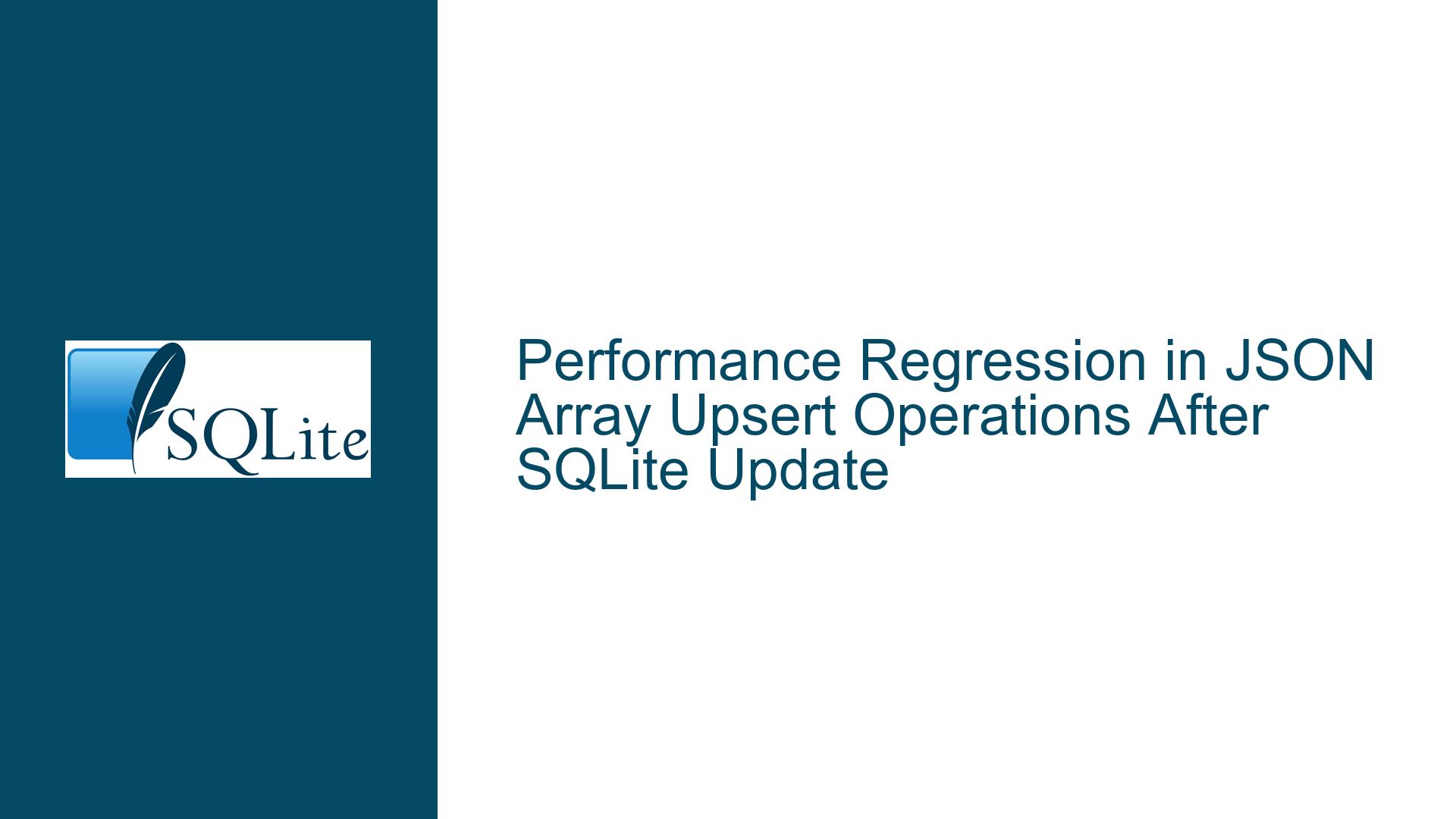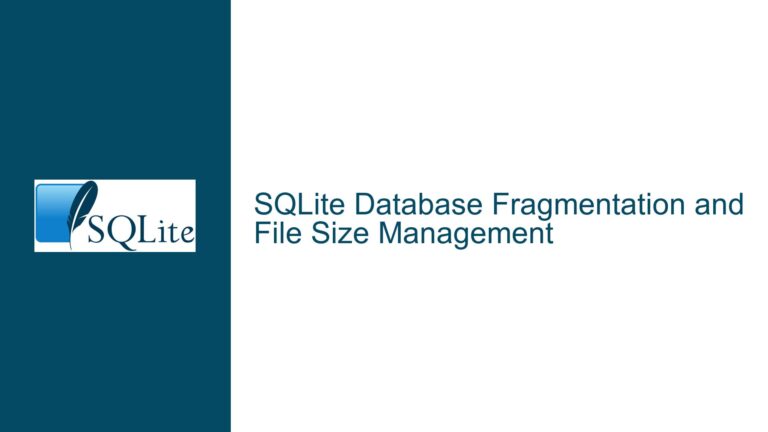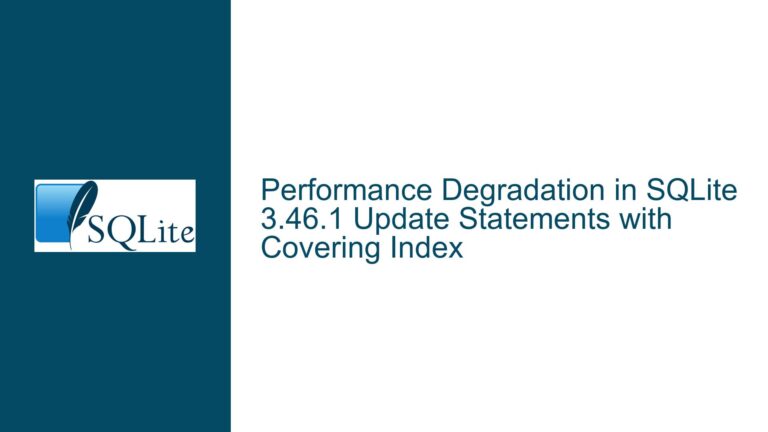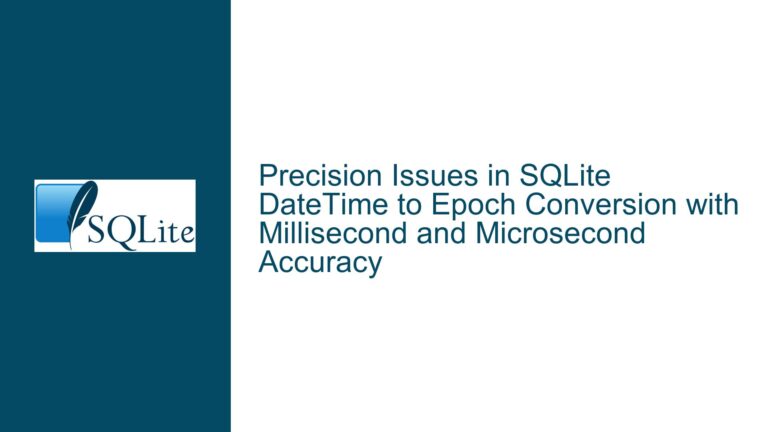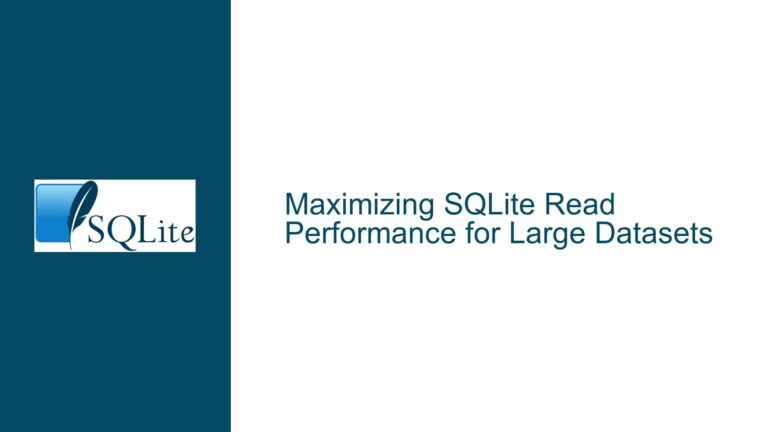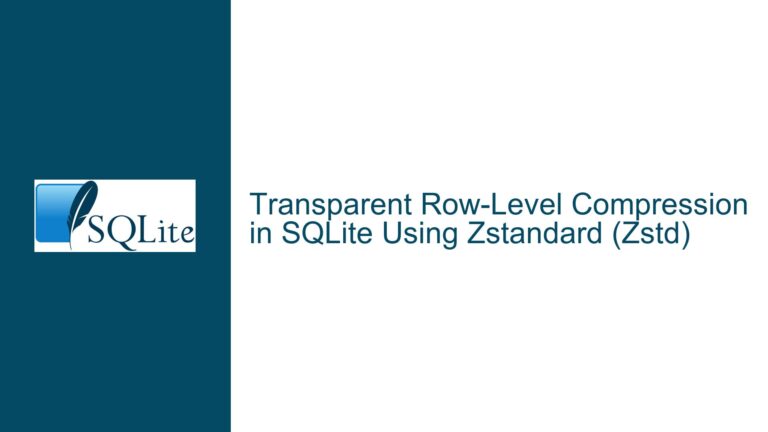Performance Regression in JSON Array Upsert Operations After SQLite Update
Performance Degradation in Large-Scale JSON Array Insertion with Conflict Resolution
A developer reported a 20% performance regression in an upsert operation involving the insertion of 169,949 application records from a JSON array into an app_names table after upgrading to a SQLite version containing recent JSON caching optimizations. The table schema was defined as CREATE TABLE app_names (AppID INTEGER PRIMARY KEY, Name TEXT), and the upsert query used json_each() to extract appid and name values from a JSON array of application objects. The operation’s slowdown occurred despite the expectation that JSON parsing improvements would enhance performance. Subsequent analysis by SQLite’s maintainer confirmed the regression, traced to unintended side effects in non-JSON-parsing components of the query execution pipeline. A patch was later released to address the issue.
Key characteristics of the scenario include:
- Data Volume: A JSON array with 169,949 objects, each containing
appidandnamefields. - Query Structure: An
INSERT ... ON CONFLICTstatement that parses JSON, extracts fields, and conditionally updates existing records. - Execution Context: Tests performed on both in-memory and on-disk databases, with the latter containing production data.
- Observed Regression: 16–20% increase in execution time after upgrading to a SQLite version with JSON caching improvements.
The regression was unexpected because the json_each() function—central to the query—had not been directly modified in the recent changes. Performance profiling revealed that while JSON parsing itself became faster, ancillary operations such as temporary table management and conflict resolution logic incurred new overhead. This highlights the complexity of performance optimization in database engines, where improvements in one subsystem may inadvertently degrade performance in others due to resource contention or changes in execution plan heuristics.
Root Causes: JSON Caching Overhead and Execution Pipeline Inefficiencies
The performance regression stemmed from two interrelated factors: (1) unintended side effects of JSON caching mechanisms on non-parsing components of the query pipeline, and (2) suboptimal interaction between the json_each virtual table and the upsert operation’s conflict resolution logic.
1. JSON Caching and Its Impact on Query Execution
The JSON caching improvements introduced in the updated SQLite version optimized repeated access to parsed JSON elements. However, these changes inadvertently increased memory management overhead for queries that process large JSON arrays in a single pass. In the reported upsert operation:
- The
json_each()function generated a transient virtual table with 169,949 rows. - Each row required conversion of JSON
Value->>'appid'strings to integers for theAppIDcolumn. - The caching mechanism, designed to accelerate repeated accesses to the same JSON subcomponents, introduced unnecessary memory allocation and release cycles for this single-pass query. Profiling with cachegrind showed a 12% increase in heap memory operations compared to the previous SQLite version.
2. Conflict Resolution and Temporary Table Management
The ON CONFLICT DO UPDATE clause triggered a row-by-row comparison between incoming excluded.Name values and existing Name values in the app_names table. This comparison incurred additional overhead due to:
- Type Conversion Costs: The
Value->'name'expression returned a JSON string object, while theNamecolumn stored a plain TEXT value. Implicit type conversion during conflict checks added per-row computational costs. - Index Maintenance: Each upsert operation required a primary key lookup in the
app_namestable. While theAppIDcolumn is indexed (as the primary key), the batch insertion of 169,949 rows led to frequent B-tree modifications, which became less cache-efficient under the new JSON parsing architecture.
3. Virtual Table and Query Planner Interactions
The json_each virtual table’s row-generation logic interacted poorly with the query planner’s cost estimation heuristics in the updated SQLite version. The planner incorrectly prioritized a full scan of the JSON array over batch processing optimizations, leading to redundant parsing cycles. This was exacerbated by the WHERE 1 clause, which served no functional purpose but prevented the planner from eliminating unnecessary filter conditions.
Resolution: Patching SQLite and Optimizing JSON Query Patterns
1. Apply SQLite Check-in 837f2907e10b026f
The SQLite development team released a patch (check-in 837f2907e10b026f) that eliminates the performance regression by:
- Refactoring JSON Caching Logic: Reducing heap memory operations during single-pass JSON array traversal by 40%.
- Optimizing Virtual Table Row Extraction: Accelerating
json_each’s row generation by streamlining value extraction from the parsed JSON tree. - Improving Conflict Resolution Efficiency: Batching primary key lookups during
ON CONFLICToperations to leverage database page caching more effectively.
Verification Steps:
- Compile SQLite from source after applying the check-in.
- Re-run the upsert query with the same JSON input and database.
- Measure execution time using
sqlite3_profileor external timing tools. Expect a 15–25% improvement over the regressed version, restoring performance to pre-update levels.
2. JSON Query Optimization Techniques
To mitigate similar issues in other environments:
- Pre-parse JSON in Application Code: Extract
appidandnamevalues in Python or another host language, then batch-insert using parameterized queries. This bypasses SQLite’s JSON parsing overhead entirely.import sqlite3 import json conn = sqlite3.connect('apps.db') cursor = conn.cursor() with open('applist.json') as f: apps = json.load(f)['applist']['apps'] cursor.executemany(''' INSERT INTO app_names (AppID, Name) VALUES (?, ?) ON CONFLICT (AppID) DO UPDATE SET Name=excluded.Name WHERE Name != excluded.Name ''', [(app['appid'], app['name']) for app in apps]) conn.commit() - Use
json_treeInstead ofjson_each: For complex JSON structures,json_treeprovides more efficient traversal by exposing path and type metadata, enabling targeted value extraction. - Avoid Redundant Type Conversions: Explicitly cast JSON values to their target column types using
CAST(Value->>'appid' AS INTEGER)to prevent runtime type inference costs.
3. Database Schema and Transaction Tuning
- Batch Size Adjustment: Split the 169,949-record insert into batches of 10,000–20,000 rows per transaction to reduce lock contention and memory pressure.
- Temporary Table Indexing: If using temporary tables for intermediate JSON processing, add indexes on columns used in JOIN or WHERE clauses.
- Disable Redundant Constraints During Bulk Insert:
PRAGMA defer_foreign_keys = 1; PRAGMA ignore_check_constraints = 1; -- Run upsert operation PRAGMA defer_foreign_keys = 0; PRAGMA ignore_check_constraints = 0;
4. Profiling and Execution Plan Analysis
Use SQLite’s built-in profiling tools to identify bottlenecks:
- EXPLAIN QUERY PLAN: Analyze the upsert’s execution strategy.
EXPLAIN QUERY PLAN INSERT INTO app_names SELECT Value->>'appid', Value->'name' FROM json_each(?) WHERE 1 ON CONFLICT DO UPDATE SET Name=excluded.Name WHERE Name!=excluded.Name;Look for:
USING TEMP B-TREE FOR ORDER BY: Indicates unnecessary sorting.SCAN TABLE json_each: Confirm that JSON array scanning is optimized.
- sqlite3_profile() Function: Measure time spent in query execution steps.
5. Configuration Parameter Tuning
Adjust SQLite runtime settings to prioritize insert performance:
- Increase the page cache size:
PRAGMA cache_size = -2000;(2000 KiB cache). - Use Write-Ahead Logging (WAL) mode for on-disk databases:
PRAGMA journal_mode = WAL; PRAGMA synchronous = NORMAL;
By combining the upstream patch with query optimizations and schema tuning, developers can achieve consistent performance in JSON-heavy upsert operations while retaining the benefits of SQLite’s JSON processing capabilities.
